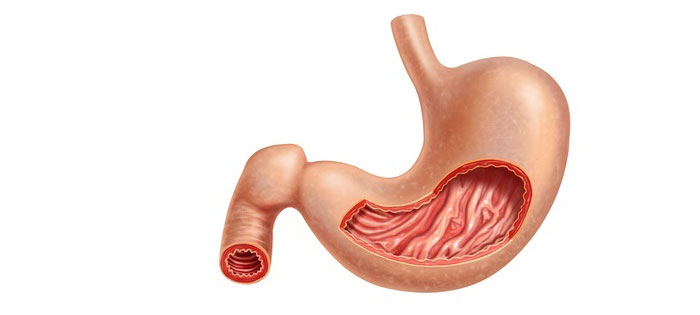Our stomach mostly plays a role in terms of digestion; very little absorption takes place here, other than certain medications, some water, certain salts and alcohol.
The stomach acts like a blender, with its multiple layers of muscle it is able to churn and toss our food to help mix it with gastric juices for digestion and eventually turn it into a soupy liquid known as chyme that gets passed through to the small intestine for further digestion and absorption.
Within the stomach we have some very important features. One of those being hydrochloric acid (HCl). HCl is crucial for:
- Food sterilisation, helping kill of any nasty bugs from the outside that might be on your food. The lower your HCl levels the higher your risk of developing a digestive infection.
- Lowering pH. When your acidic chyme gets passed into your small intestine it is the low pH/acidity from HCl production that stimulates other enzymes to be released or to act upon food for further breakdown. Thus low HCl or an increase pH may actually lead to poor digestion and absorption further down the chain.
- Protein breakdown. HCl activates/converts the enzyme pepsinogen into pepsin. Pepsin is the enzyme that breaks down protein into peptides so they can be acted on more easily in the small intestine by other digestive enzymes.
HCl is just one of numerous substances that make up gastric juices. Others include certain enzymes, hormones and intrinsic factor. Intrinsic factor is made in the parietal cells (as is HCl) in the stomach and then binds to vitamin B12 so it can be easily absorbed in to intestines. Thus low intrinsic factor can be a major cause of low B12 levels and thus a possible cause of certain types of anemia along with the vast array of other symptoms associated with low B12.
The parietal cells require a huge amount of energy to function correctly, thus those with any type of mitochondrial dysfunction (inability to produce energy on a cellular level) may lead to poor production of HCl and intrinsic factor.
Certain bugs as well can get into the stomach and impact on the functioning of the parietal cells. One of the most common offenders is H.Pylori. H.Pylori has been shown to damage the parietal cells of the stomach, and thus prevent the optimal secretion of HCl and intrinsic factor, and unfortunately H.Pylori is more common than people think, and often missed with standard stool testing and breath tests.
Interestingly there are ways that we can increase food duration in the stomach and slow gastric emptying, something that might be of benefit when trying to balance blood glucose levels, yet may not be of benefit when trying to deliver nutrients as quickly as possible such as post workout or someone that is hypoglycaemic.
Both fat and fiber are able to slow gastric emptying and increase food duration in the stomach. Interestingly stress can also have impacts on gastric emptying, acute stress responses have been shown to shorten time spent in the stomach (this may be where the phrase “to shit one’s self came from”). On the other hand chronic stress appears to lengthen the amount of time spent in the stomach, however it is said that increased levels of stress hormones and stimulation of the sympathetic nervous system can have negative effects in the production of gastric juices, and thus would not be a beneficial side effect, but more a sign of the digestive system shutting down.
Tips to help the stomach do its job
- Eat in a relaxed environment, remreber that digestion starts in the brain.
- Chew food thoroughly, the bigger the surface area upon reaching the digestive system the easier the food can be broken down further.
- Look for symptoms of low HCl. These can be seen in section B1 of my online health quiz.
- Look out for typical symptoms of a H.Pylori infection such as reflux, bloating, belching, acid indigestion, constipation, extreme tiredness, trouble falling or staying asleep.
- If you suspect a H.Pylori infection you may want to consider a digestive health screen with stool analysis
Contact Steve Grant Health
To learn more out how Steve Grant Health can assist you on your journey, please fill out the enquiry form below.
Please note that depending on your specific circumstances and goals, Steve may recommend that you work with one of the specialist practitioners within his network of trusted professionals.
If you have been referred by a clinician, please complete the form and ensure that you state who has referred you or have your practitioner email Steve direct to make a referral that way.
Click the button below to open the client enquiry form:
[widgetkit id=”643″]


